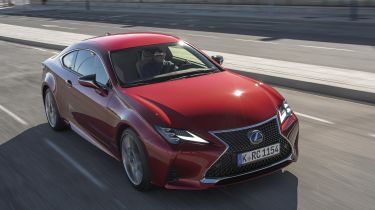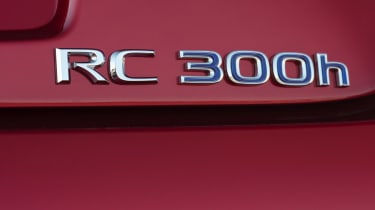Lexus RC review - MPG, CO2 and Running Costs
RC’s hybrid option is rare in this sector but the 200t turbo should be more efficient. The lack of diesel is a hindrance
The RC’s engine options range from the fairly frugal (for a petrol) to the extremely thirsty.
The most efficient on paper is the RC 300h hybrid. It’s capable of 57.6mpg combined cycle economy and CO2 emissions of 113g/km, which will make it attractive to company car buyers. For a naturally-aspirated 2.5-litre four-cylinder petrol engine it’s an impressive figure, but you have to remember that hybrids have a tendency to skew the official numbers. More realistically, you can expect around 40mpg in mixed driving, rising as you cruise around town using electric power and falling at higher speeds when relying on the petrol engine.
That compares well with conventional turbo petrol engines in rivals but then, the RC 300h is less exciting to drive. It’s better measured against diesel alternatives and there things don’t look quite as favourable. For example, the BMW 420d is faster yet more efficient on paper (and in the real world) managing 60.1mpg. The Lexus wins on CO2, however, as the BMW emits 124g/km.
The RC200t shows why it isn’t expected to be the biggest seller in the RC coupe range. It manages just 38.7mpg combined, which looks a bit lacklustre compared to the 53.3mpg of the Mercedes C 200 Coupe and the 42.8mph of the much quicker BMW 428i. In the real-world, you’ll find around 30mpg the norm in sensible mixed driving, which is closer to rivals but still far from impressive. It also emits a fairly substantial 168g/km.
The hot RC F is in a different league when it comes to performance, and also in terms of economy. With a thumping great V8 it achieves 26.2mpg on the combined cycle and emits 252g/km. A BMW M4 gets 32.1mpg and 199g/km, while the outgoing V8-powered Audi RS5 Coupe is similar to the Lexus, at 26.9mpg. In reality you’ll struggle to get the RC F to stay in the low twenties, even if you’re careful.
Insurance
Given the RC’s show-stopping styling, performance and premium image, it makes sense that it’s not that cheap to insure. It starts at group 34 for the RC 300h hybrid which is similar to an Audi A5 2.0 TFSI. The RC 200t is a chunky group 40 in F-Sport trim, however, which is well above any of the established petrol Germans.
The RC F, as you’d expect, won’t be cheap to cover. At group 48, its comparable with the 503bhp Mercedes C 63 AMG S Coupe.
Depreciation
Lexus’s dependable and solid reputation, combined with its excellent dealer service, means its cars generally fare well for depreciation. Surprisingly, forecasts for the RC aren’t good, however.
All standard RC variants are predicted to retain between 36 and 38 per cent of their value over three years, which is quite a way off the 46-48 per cent of the BMW 4 Series. At least the RC F fares surprisingly well, at around 43 per cent.




